Los Angeles Agonistes
As violence and political protest unfolds in LA, some political pundits see the situation as a net positive for Trump ... I'm not so sure.
If you are a free subscriber and you like what you’re reading, maybe it’s time to upgrade to a paid subscription.
This newsletter is 100% reader-supported, and your subscription helps me continue publishing.
When you become a paid subscriber, you receive access to all my posts, the ability to comment on posts and engage in the Truth and Consequences community, and, above all, you get the warm and fuzzy feeling that comes with supporting independent journalism!
Members of the Trump administration are very upset that political protesters are attacking law enforcement officers.
Look, I don’t expect ideological consistency from people who work for Donald Trump … but are you f’ing kidding me? Lest we forget, five months ago, Trump pardoned the people responsible for the January 6 assaults on federal law enforcement officers.
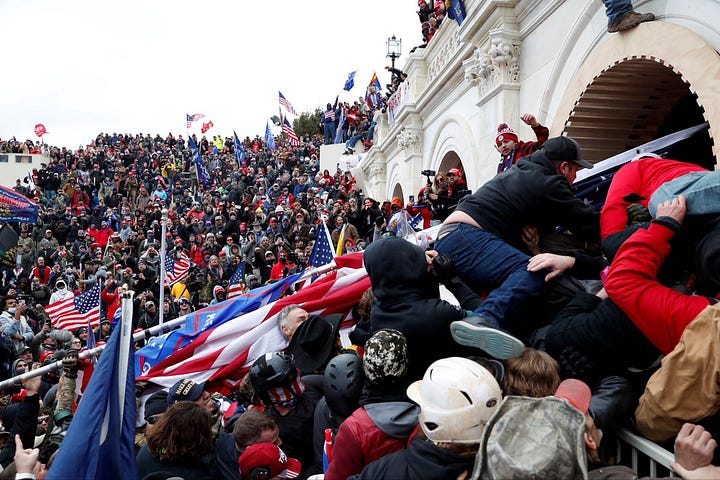
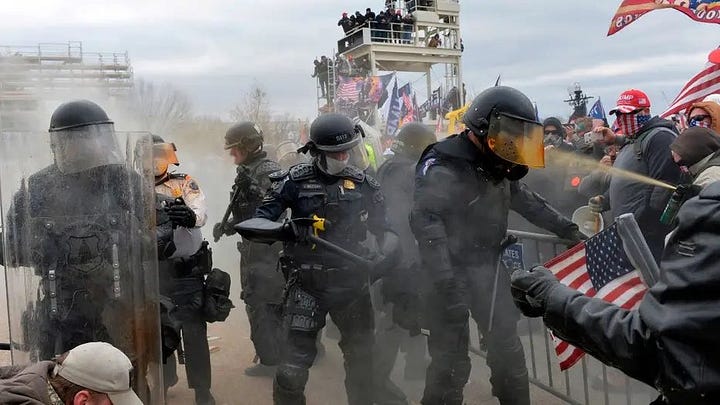

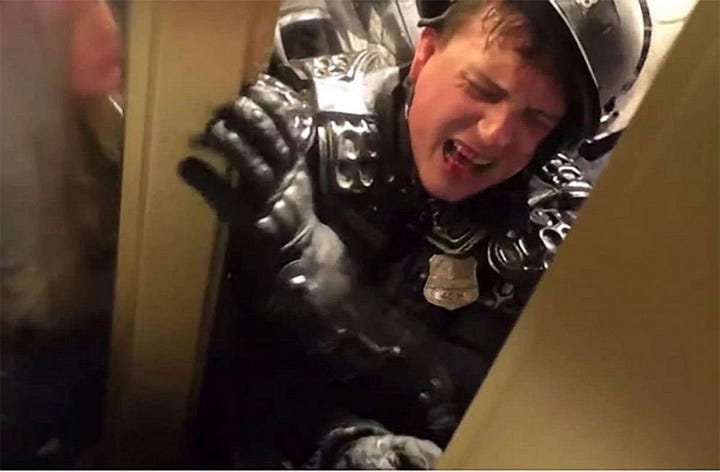
The hypocrisy of decrying attacks on law enforcement officials in Los Angeles while venerating people who committed far worse attacks on January 6 is political hypocrisy to the nth degree.
Judging the Political Fallout
A host of conspiracy theories are floating around social media as to why Trump is escalating the situation in Los Angeles by deploying the National Guard to quell the protests. There is also rampant speculation about what he might plan to do next (invoking the Insurrection Act is one possibility). I don’t want to venture too far down those rabbit holes because I’m honestly not sure how this plays itself out. These demonstrations are somewhat limited, and my general sense is that this might peter out before things really escalate.
But when it comes to the political fallout from what’s happening in Los Angeles, I have some thoughts. Local font of political conventional wisdom, Chris Cillizza, has not surprisingly taken the view that the protests in LA, which have been violent and featured “masked protesters waving Mexican flags standing in front of the burning cars,” will help Trump politically.
That’s certainly a possibility, but I was trying to think today of a single recent example in which political protests/demonstrations on the streets of America’s cities bolstered the incumbent party. The only possible example that came to mind was the so-called “Hard Hat Riot” in May 1970, when construction workers descended on and beat up anti-war protesters near Wall Street in New York City. At the time, White House chief of staff H.R. Haldeman wrote in his diary, “The college demonstrators have overplayed their hands, evidence is the blue-collar group rising up against them, and the president can mobilize them.”
Indeed, Nixon tried to use anti-war protests and the invocation of the Silent Majority as a political cudgel in the 1970 midterm elections. Nixon barnstormed the country telling voters “that the answer to those that engage in disruption--to those that shout their filthy slogans, to those that try to shout down speakers--is not to answer in kind, but go to the polls on election day, and in the quiet of that ballot box, stand up and be counted: the great silent majority of America."
Less remembered, however, is that in midterm elections that year, Democrats still picked up a dozen seats in the House and won 11 governorships. While they lost two seats in the Senate, the Democrats maintained a solid majority, despite the Senate map favoring Republicans.
This is not to say that the political protest helped Democrats, but instead suggests that perhaps challenges to law and order and violent political protest tend to boomerang against incumbent parties, irrespective of the content of the demonstrations (keep in mind that the anti-war protests in 1968 did significant political damage to the Democratic Party in the presidential election that year).
The George Floyd Protests
There is, of course, a much better recent example of widespread political protest — the demonstrations and violence that followed the murder of George Floyd in Minneapolis, Minnesota.
Trump’s response to those protests bears some similarities (from June 8, 2020)
Thousands of soldiers and law enforcement officers descended on the nation's capital. Steel fences encircled the White House. Heavily armed officers met protesters with flash-bang grenades and chemical agents.
The bleak new look for the seat of American democracy last week came matched with rhetoric from President Donald Trump, who began publicly flirting with the idea of using active duty military to "dominate" and reclaim the streets from what he described as chaotic crowds in places not willing or able to contain the unrest.
How did those protests impact Trump’s approval ratings?
President Trump’s job approval rating has dropped 10 points to 39%, the lowest level it has been since October, according to a new poll.
Gallup’s poll was conduced May 28-June 4, days after the police-involved death of George Floyd, a black man from Minnesota. Floyd’s death set off a wave of protests around the country over race and policy brutality.
Do you see the dip below near the end of Trump’s first term in office? That was June and July of 2020.
Some might argue that the dropoff in Trump’s approval ratings during the Floyd protests was a by-product of his handling of them, and certainly that’s possible. But I suspect the more likely explanation is that when there is violence on America’s streets, it makes Americans uncomfortable, and they tend to blame the occupant of the White House for not keeping order. (BTW, in 2020, Cilizza wrote a piece for CNN arguing that calls for “defunding the police” and the Floyd protests, in general, would “be music to Trump’s ears.”)
In the case of what’s happening in Los Angeles, MAGA supporters will almost certainly take Trump’s side. Democratic opponents of Trump are likely to have greater sympathy for the protesters or be upset by a military show of force. As for the small number of Americans who go back and forth — and pay little close attention to politics — it’s anyone’s guess.
It’s certainly possible that seeing images of protesters burning cars and holding foreign flags will rally their support for Trump. But they could just as easily see the violence and associate it with the general instability and disorder that has accompanied Trump throughout both his presidencies. Even if people are unhappy with the demonstrations (and I think the folks burning cars are idiots and should be prosecuted), it doesn’t mean that they don’t also blame Trump for them. Moreover, to go back to my first point above, Trump doesn’t have clean hands when it comes to political violence. MAGA will, of course, ignore the hypocrisy of Trump decrying political violence after he pardoned the January 6 insurrectionists. But those pardons were not very popular, and I suspect that residual uneasiness with them will tamp down support for the White House’s tough talk about the violence in LA.
To be sure, we will have to wait several days to see what the polling says, but if history is any guide, it would be a bit surprising if the violence in LA is a political winner for Trump.
What’s Going On
The co-founder of Latinas for Trump is outraged by the administration’s “inhumane” policies toward undocumented immigrants. If only she had paid attention to literally everything Trump said about immigration policy during the 2024 campaign.
A new CBS poll shows majority support for Trump’s deportation policies ... but if you dig into the numbers, you come across this rather telling factoid: “But if people don't think it is dangerous criminals who are the focus of the deportation effort, support drops dramatically.” We saw this play out with the Kilmar Abrego Garcia story. Support for Trump’s mass deportations is built on a weak foundation, and one that is vulnerable to political backlash, the more Americans realize that the White House’s focus is on law-abiding migrants.
Greg Sargent has a smart piece on why the focus on non-criminal undocumented migrants could create political problems for the White House.
When I was a kid, I loved Frederick Forsyth’s spy thrillers, particularly “Day of the Jackal.” He passed away today at age 86.
This is a very important piece by Yair Rosenberg on how anti-Zionists, via their anti-Semitism and intolerance, are indirectly making the case for Zionism, as a political movement.
Musical Interlude

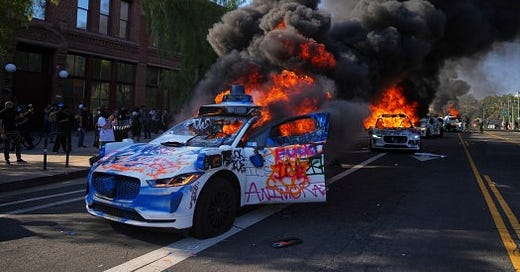






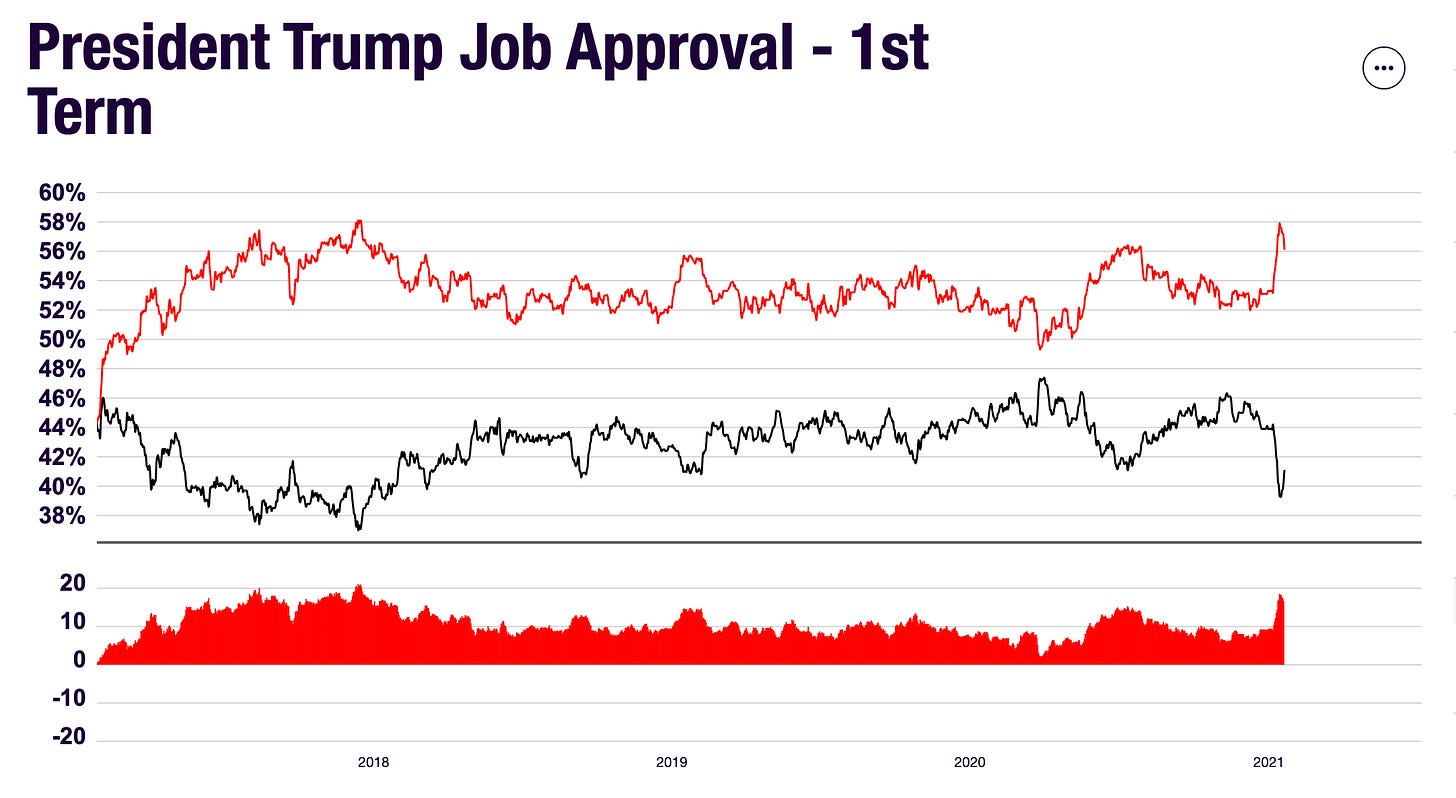
“These demonstrations are somewhat limited, and my general sense is that this might peter out before things really escalate.” Probably, until the next time, which could be tomorrow. Sooner or later I have no doubt he’s going to get his confrontation.
Latinas for Trump… it would be funny if it weren’t sad.
For the peaceful protesters exercising their First Amendment rights -
"Every time we turn our heads the other way when we see the law flouted, when we tolerate what we know to be wrong, when we close our eyes and ears to the corrupt because we are too busy or too frightened, when we fail to speak up and speak out, we strike a blow against freedom and decency and justice." Attorney General Robert F. Kennedy